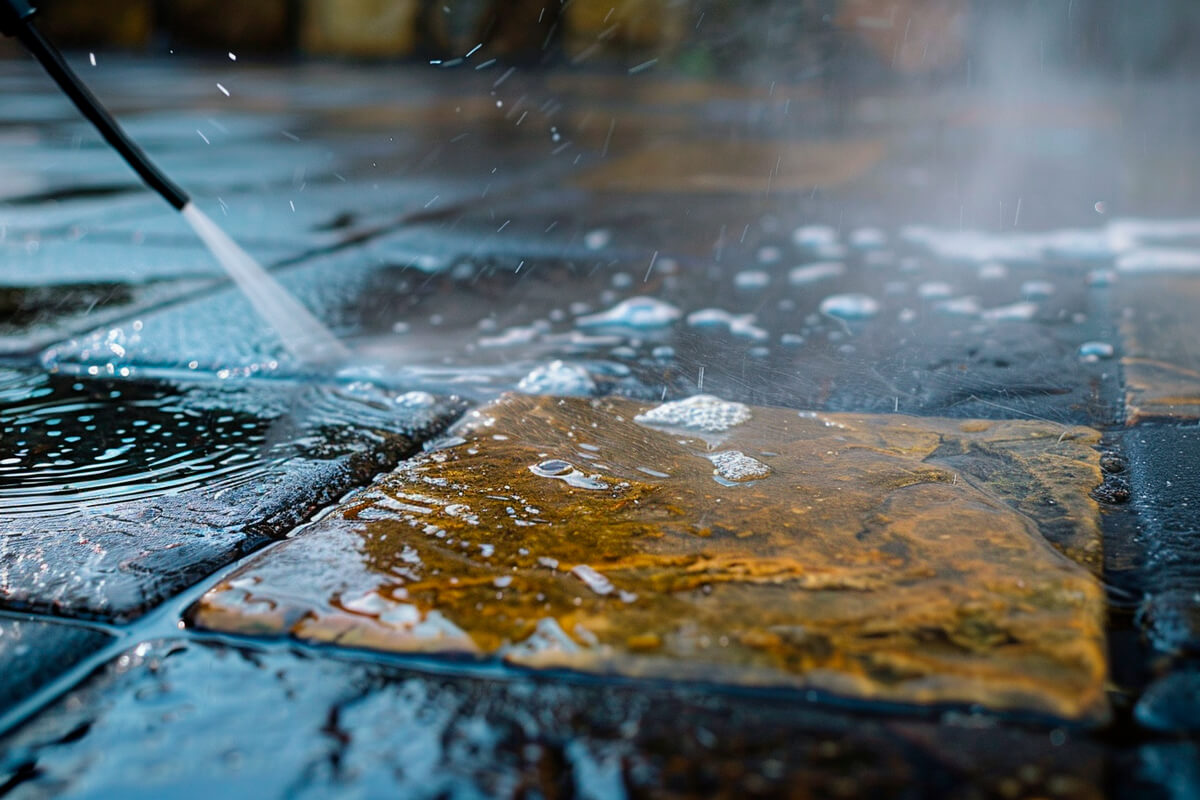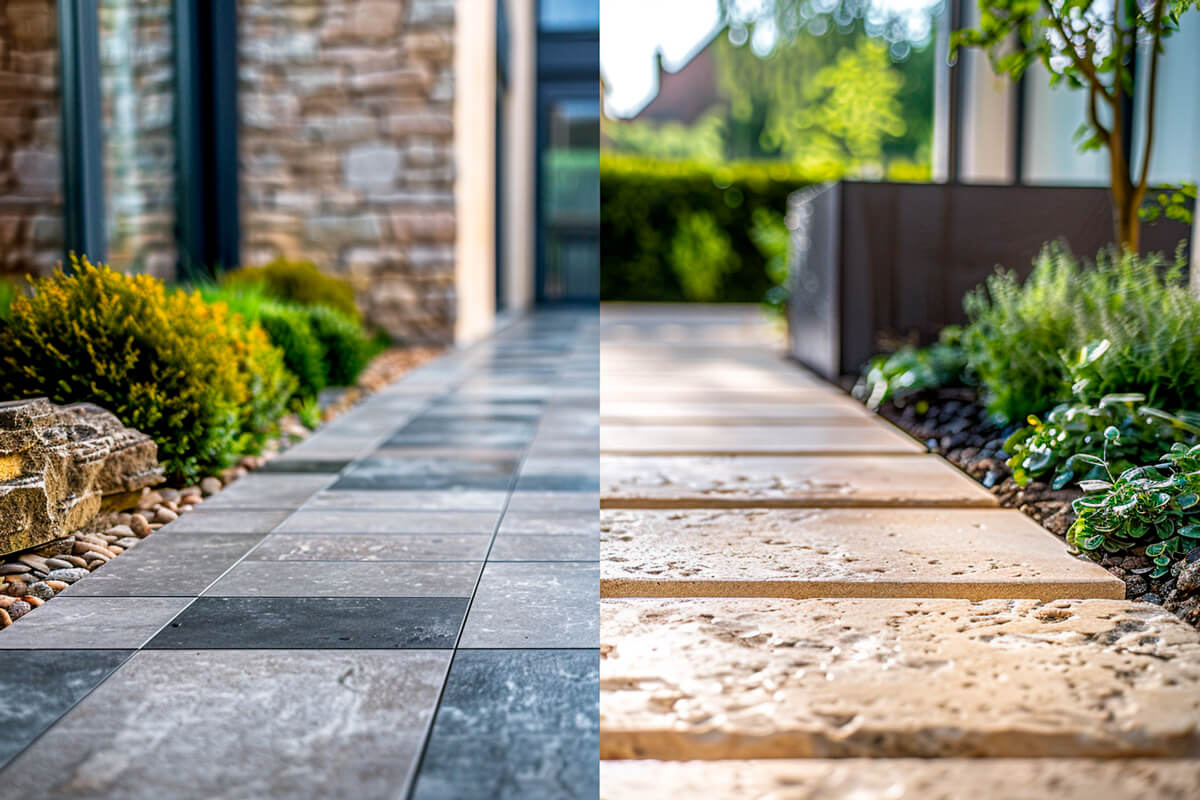Choosing the right paving material for your garden patio or outdoor space is more than just a matter of aesthetics; it’s about finding a balance between durability, maintenance, cost. As a landscape supplier, we understand the complexity behind this decision. That’s why we have put together this article to offer an in-depth comparison between porcelain and natural stone paving. Our goal is to provide you with all the necessary information to make the right decision. But before we start comparing these two paving materials, let’s first understand what they are.
What is porcelain and natural stone paving
Porcelain paving is a man-made product, crafted from a blend of clay, sand, and other minerals. These materials are fired at extremely high temperatures, resulting in slabs that are dense, durable, and non-porous. This method produces various finishes that look like natural stone or other textures, allowing design flexibility while keeping a consistent appearance and strength.
Natural Stone paving, on the other hand, is sourced directly from the earth. Materials such as granite, limestone, slate, and sandstone are quarried, cut to size, and finished according to preference. Each piece of natural stone is unique. It has different variations of colour, texture, and pattern. The durability of natural stone depends on its type, but generally, it’s highly durable and capable of withstanding various weather conditions.
Historically, natural stone was the go-to choice for its availability and natural beauty. However, improvements in manufacturing technologies have made porcelain paving a strong competitor due to its durability, ease of maintenance, and broad range of design options. So let’s take a deeper look at each of these aspects.

Durability and Maintenance
Porcelain Paving Durability
As we mentioned before, porcelain paving’s durability stems from its manufacturing process. This makes them hard and durable, which has a positive effect on their ability to resist cracks and chipping. Porcelain slabs are also non-porous, which means they absorb less than 0.5% of surface water. This feature makes them highly resistant to frost and extreme weather conditions. The vitrification process used in firing these tiles ensures they are also resistant to colour fading from UV exposure, maintaining their appearance over time.
Natural Stone Paving Durability
Natural stone paving, including granite, limestone, slate, and sandstone, is quarried from the earth. These stones have been formed over thousands or even millions of years, under high pressure and temperatures. This long natural process contributes to the unique and varied textures, colours, and patterns of natural stone, but also to its durability. Every kind of natural stone is different. Take granite for instance — it’s super tough and won’t get scratched up easily, so it works great in busy areas where lots of people walk. Natural stone is generally very resilient to weather changes and can withstand a variety of environmental conditions.
Maintenance Requirements
When it comes to maintenance, porcelain paving doesn’t require it that much. Since it’s non-porous, spills can’t soak in and stain it. You don’t need to seal it either to keep it looking good and durable. Just sweep it regularly and give it a wash with water from time to time. That’s pretty much all you need to do to keep porcelain paving looking brand new.
Natural stone, while durable, requires more maintenance to preserve its beauty and integrity. It is porous to varying degrees, depending on the type, which means it can absorb spills and moisture, potentially leading to stains, algae, and moss growth. Therefore, natural stone often requires a sealant to be applied at installation and periodically reapplied to protect it. Regular cleaning, including pressure washing and the use of specific cleaning agents to prevent or remove stains and biological growth, is also more critical with natural stone.
In summary, while both porcelain and natural stone pavings offer considerable durability suitable for outdoor applications, their maintenance needs differ significantly. Porcelain offers ease of care, making it a practical choice for those seeking minimal upkeep. Natural stone, with its unique beauty, demands more attention but rewards with character that can enrich with age.

Aesthetic Appeal and Design Flexibility
Style Options in Porcelain Paving
Porcelain paving gives you a ton of style choices to work with – it can suit any design vibe you’re going for. Thanks to modern manufacturing, porcelain tiles come in all sorts of colours, textures and patterns. The coolest part is how they can mimic the look of natural stone, wood, concrete, even metal! So you get that sleek aesthetic along with the durability and easy maintenance of porcelain. This versatility means porcelain works for any architectural style from traditional to modern. And since the tiles are so consistent, you get that uniform, cohesive look which is ideal for creating a slick, stylish outdoor living space.
Natural Beauty of Stone Paving
The beauty of natural stone is that no two slabs are exactly the same. Since it’s quarried from the earth, each piece is totally unique. This natural variation gives so much depth, character and timeless elegance. You’ve got all these different material options like granite, limestone, slate, and sandstone – each with its own distinct colours, textures and patterns based on how they formed in nature. From the subtle shades in granite to the rich tones of sandstone, natural stone has an unmatched vibrance and sense of life. This inherent beauty connects your outdoor space to the natural world in a way that evolves and grows more striking over time.
Installation and Long-Term Care
Laying Porcelain Paving
Installing porcelain paving needs to be done carefully to make sure it lasts and performs well. First, you create a solid, level base using compacted gravel topped with a mortar bed. One key step for porcelain is applying a slurry primer to the back of each tile before laying it on the mortar. This primer is crucial for getting the tiles to properly bond since porcelain is dense and doesn’t naturally stick as well as more porous materials. After laying the tiles, the joints get filled with a tough, weather-resistant grout that complements the porcelain’s strength. Just be sure to follow the manufacturer’s instructions for the primer and grout to ensure durability and good looks.
Installing Natural Stone
The process for installing natural stone shares some similarities with porcelain but has its own quirks since the material itself is so variable. Once that stable base is prepped, each individual stone slab gets laid onto a mortar bed. But because natural stone can differ in thickness and size, adjustments often need to be made to the mortar height to keep everything level. Depending on the stone type, sealing may be required before or just after installation to prevent staining and weathering. The joints then get grouted like porcelain, but the grout choice can vary based on the stone and desired look. Since no two natural stones are alike, some planning is required to get an appealing layout of colours and patterns.
Long-Term Care and Upkeep
For both porcelain and natural stone, basic maintenance goes a long way in preserving that fresh look and extending its lifespan. Porcelain is pretty low-maintenance – regular sweeping and an occasional rinse with water is usually enough to keep it clean. Stubborn stains can typically be removed with some mild detergent without damaging the surface.
Natural stone might need a bit more TLC depending on the type and location. Sealing the stone can prevent stains and weathering, though this may need to be reapplied every few years. Routine cleaning with a gentle detergent and brushing helps stop algae and moss buildup, especially in damp or shady areas. If stains or damage do occur, some stones can be sanded or resealed to restore their appearance.
For both materials, act fast to clean up any spills or organic debris and avoid harsh chemicals that could cause damage. Checking the joints and base regularly to repair any issues will help keep the paving stable and attractive for years to come.
Cost Analysis
When it comes to paving materials, you can’t just look at the upfront price tag. To understand the full investment over time in the UK market, you need to factor in installation costs, ongoing maintenance, and how it could impact your property’s overall value down the road.
Initial Costs
Porcelain Paving: For the materials alone, porcelain tends to run anywhere from £26.50 to £75 per sqm plus VAT for large format Italian. So the price depends on quality, finish, and how fancy the design is. But then you’ve got to add professional installation on top of that, which could be another £100 to £150 per square meter to cover labour and stuff like mortar and primer that’s required for a solid install. Porcelain needs to be laid precisely, so hiring pros is highly recommended even though it increases the total cost.
Natural Stone Paving: Natural stone pricing is all over the place – £26.50 to £40 per sqm except for Yorkstone paving. It varies based on the specific type of stone, where it’s from, and the finish. Installation costs are similar to porcelain at around £100 to £150 per meter, factoring in site conditions and design complexity. Some natural stones need less prep than porcelain, but the variations in thickness make it trickier to get a level surface without extra labour.
Long-Term Value
Durability and Maintenance: Porcelain’s hardiness and very low maintenance translate to lower long-term costs. Since it doesn’t really stain, fade or wear down, it keeps looking fresh for years with basic upkeep, potentially saving you from costly repairs or replacements down the line.
Natural stone is durable too, but tends to require more maintenance long-term. You’ll need periodic sealing and cleaning to keep it looking good, and repairing or replacing damaged slabs can add up over time. However, that natural aging process gives stone tons of character which could increase your property’s overall value and appeal.
Adding Property Value: Both porcelain and natural stone can significantly boost a property’s aesthetics and livability of outdoor areas. Porcelain comes in so many styles that it complements modern and traditional homes alike – a lasting, sharp-looking landscaping solution. Natural stone’s uniqueness and timeless beauty enhance a property’s charm and character in a way that draws buyers looking for quality and that natural vibe.
So in summary, while porcelain may have lower upfront or comparable costs to natural stone initially, its durability and low maintenance make it a great long-term value. Stone requires more care long-term but offers unbeatable looks and character that increase a property’s draw and resale value. Homeowners need to weigh those immediate vs. future costs and benefits when choosing paving for their UK outdoor spaces.
Pros and Cons Summary
Porcelain Paving Pros:
- Low maintenance requirements
- Extremely durable and long-lasting
- Wide variety of styles mimicking natural stone, wood, etc.
- Consistent and uniform appearance
- Resistant to staining and fading
Porcelain Paving Cons:
- Professional installation is strongly recommended
- May look too uniform/manufactured for some tastes
Natural Stone Paving Pros:
- Unique natural beauty and character
- Timeless, classic aesthetic appeal
- Each slab is truly one-of-a-kind
- Can increase overall property value
- Natural aging enhances the look over time
Natural Stone Paving Cons:
- Requires more frequent maintenance (sealing, cleaning)
- More prone to staining and weathering over time
- Higher costs for repairs and replacing damaged slabs
Final word
At the end of the day, there is no objectively “better” choice between porcelain and natural stone paving. Each material has its own unique set of strengths and aesthetic qualities to offer. As a landscaping supplier with a vested interest in your complete satisfaction, our role is to provide you with the insights to make the most informed decision for your specific needs and tastes.
Regardless of which direction you choose to go, our team is here to guide you through every step of selecting and installing the perfect paving for your outdoor space.

